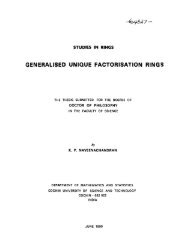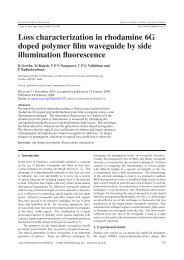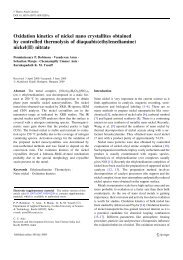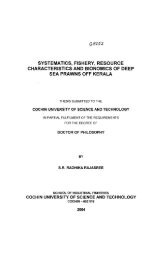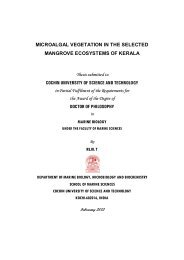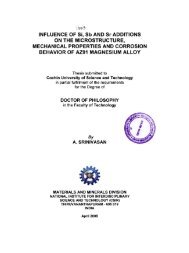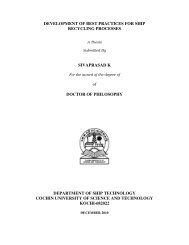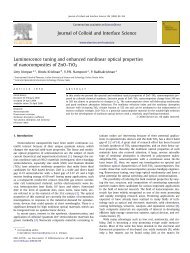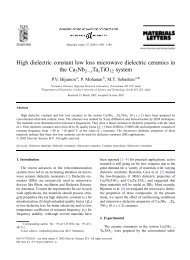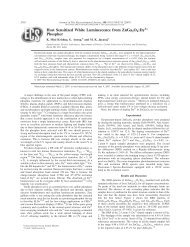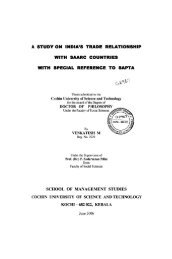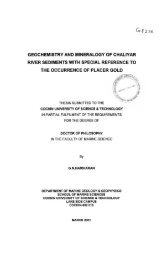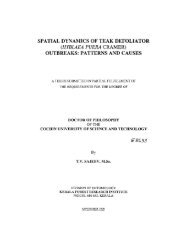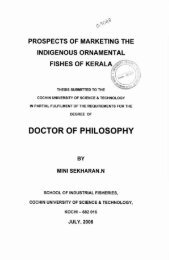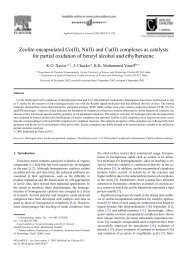- Page 1: THE GINGER ECONOMY OF KERALA Thesis
- Page 4 and 5: List of Tables Table No. TItle Page
- Page 6: Table No. TItle Page No. 6.3 Monthl
- Page 9 and 10: Chapter One Introduction
- Page 11: Indo-China region is supposed to be
- Page 15 and 16: oil contributing the aroma and the
- Page 17 and 18: Kerala is the leading producing sta
- Page 19 and 20: Ginger is a traditional item of the
- Page 21 and 22: District Malappuram Kozhikode Wynad
- Page 23 and 24: 1.5 Objectives of the Study The maj
- Page 25 and 26: sample of 30 farmers were selected.
- Page 27 and 28: Cost of cultivation of ginger in Wy
- Page 29 and 30: India and Kerata, presents the rese
- Page 31 and 32: Cbapter Two Review of Literature Th
- Page 33 and 34: George and Velappan throw light on
- Page 35 and 36: pr.emacy in the manufacture and exp
- Page 37 and 38: pepper, cardamom, coconut, arecanut
- Page 39 and 40: United States. H. Singh brings out
- Page 41 and 42: tion a price policy for an individu
- Page 43 and 44: teristic be quantified and incorpor
- Page 45 and 46: study reveals that the higher expec
- Page 48 and 49: consumer's rupee of agricuJtural co
- Page 50 and 51: Chapter Three Trends in Area, Produ
- Page 52 and 53: Table 3.1 Area, Production and Yiel
- Page 54 and 55: Year 1990-91 1991-92 1992-93 1993-9
- Page 57 and 58: Table 3.3 Area, Production and Yiel
- Page 59 and 60: Year 1990-91 1991-92 1992-93 ]993-9
- Page 62 and 63:
.. 000 3500 3000 2500 2000 1500 100
- Page 64 and 65:
Table 3.4 Area Under Ginger in Majo
- Page 66 and 67:
Table 3.5 Production of Ginger in M
- Page 68 and 69:
Table 3.6 Yield per hectare of Ging
- Page 70:
For comparison, the compound growth
- Page 73:
Year 1982-83 1983-84 1984-85 1985-8
- Page 76 and 77:
district. The area under pineapple
- Page 78 and 79:
Chapter Four Acreage Response
- Page 81 and 82:
the anticipated returns from differ
- Page 83 and 84:
egion to another, no unique hypothe
- Page 85 and 86:
of area and actual area under the c
- Page 87 and 88:
Table 4.1 Results of Acreage Respon
- Page 89:
Lagged values of price and area thu
- Page 92 and 93:
district two crops are reported as
- Page 94 and 95:
Thus, in Ernakulam district current
- Page 96 and 97:
Chapter Five Cost of Cultivation Da
- Page 98 and 99:
Table 5.1 Nature of Ginger Cultivat
- Page 100 and 101:
Ginger requires a well drained soil
- Page 102 and 103:
nation and to prevent washing off s
- Page 104:
Table 5.3 Distribution of Ginger Fa
- Page 107 and 108:
60% of farmers in both districts de
- Page 109 and 110:
are cultivating ginger as an interc
- Page 111 and 112:
Table 5.7 Cost of Cultivation of Gi
- Page 113 and 114:
Table 5.8 Components of Cost of Cul
- Page 115:
COMPONENTS OF COST OF CULTIVATION O
- Page 118 and 119:
more or less same in two districts,
- Page 120 and 121:
Table 5.11 Number of Sampled Farmer
- Page 122 and 123:
trict over another on all these asp
- Page 124 and 125:
Chapter Six l\:larketing The develo
- Page 126:
112 For a greatly populous developi
- Page 129 and 130:
marketing practices followed in the
- Page 131 and 132:
6.6. Processing of Ginger Processin
- Page 133 and 134:
6.7.1. Storage of Seed Rhizome Ging
- Page 135 and 136:
121 The wastage in storage of fresh
- Page 137:
6.10. Grading 123 In order to gain
- Page 143:
Marketing Channels of Fresh Ginger.
- Page 148 and 149:
Year Apr. May June July Aug. Sept.
- Page 150 and 151:
136 Generally, the ginger prices ar
- Page 152 and 153:
ments as well (Moore, Johl and Khus
- Page 154:
available to make good approximatio
- Page 158 and 159:
Table 6.5 Shares of Marketing Cost
- Page 161:
6.13.6. Price Spread of Fresh Ginge
- Page 164:
150 The farmers and traders report
- Page 167 and 168:
Tabel 6.9 Shares of Marketing Cost
- Page 170 and 171:
6.14.4. Price Spread of Pineapple 1
- Page 172 and 173:
Table 6.11 Shares of Marketing Cost
- Page 174 and 175:
price spread. 160 The marketing pat
- Page 176 and 177:
world. Chapter Seven Ginger Export
- Page 178 and 179:
exporters for the purchase of Gas C
- Page 180 and 181:
exporters through a foreign trade e
- Page 182 and 183:
'ungarbled' and the grades have bee
- Page 184 and 185:
Year 1964-65 1965-66 1966-67 1967-6
- Page 186:
GINGER EXPORT FROM INDIA - QUANTITY
- Page 189 and 190:
Table 7.2 Compound Growth Rates of
- Page 191 and 192:
176 The export growth of ginger oil
- Page 193 and 194:
Table 7.5 Compound Growth Rates of
- Page 195 and 196:
Table 7.6 Share of Ginger in the Sp
- Page 197 and 198:
Year 1993-94 1994-95 1995-96(P) (P)
- Page 199 and 200:
Table 7.7 World Export of Ginger an
- Page 201 and 202:
Year Indian Chinese 1989-90 78.94 7
- Page 203 and 204:
1995-96 Quantity Value 1993-94 1994
- Page 205 and 206:
COMPOSITION OF EXPORT OF GINGER FRO
- Page 207 and 208:
Table 7.10 Zone-wise Export of Ging
- Page 209 and 210:
contributed by West Asia. In 1991-9
- Page 211 and 212:
1992-93 1993-94 1994-95 1995-96 (P)
- Page 213 and 214:
7.S. Relation between Domestic and
- Page 215:
Year 1992-93 1993-94 1994-95 1995-9
- Page 218 and 219:
Table 7.13 Mac Bean Index of Instab
- Page 220 and 221:
205 The estimated regression equati
- Page 223 and 224:
208 produced in other states are co
- Page 225 and 226:
210 three decades, world trade in g
- Page 227 and 228:
Chapter Eight Problems of Ginger Cu
- Page 229 and 230:
Table 8.1 Problems of inputs Proble
- Page 231 and 232:
215 eties like 'Suprabha', 'Suruchi
- Page 233 and 234:
S.2. Marketing problems 217 In the
- Page 235 and 236:
8.2.3. Price Fluctuations 219 There
- Page 237 and 238:
8.3.1. Credit 221 Non-availability
- Page 239 and 240:
Chapter Nine Summary of Findings an
- Page 241 and 242:
224 2.18% per annum. Orissa stands
- Page 243 and 244:
226 (iii) Cost of cultivation of al
- Page 245 and 246:
228 practices, instability of price
- Page 247 and 248:
(i) Non-availability of fertile lan
- Page 249 and 250:
232 (ix) Attention should be paid t
- Page 251 and 252:
Branson, R.E, and D.G. Norvel!. Int
- Page 253 and 254:
Jakhade, VM, and N.A Majumdar. "Res
- Page 255 and 256:
Lakshmanchar, M. S. "Marketing of G
- Page 257 and 258:
281 "The Dynamics of Supply Retrosp
- Page 259 and 260:
Reddy, Nakula. "Farm Supply Respons
- Page 261 and 262:
Sreekumar, B, V Haridasan, and P Ra



